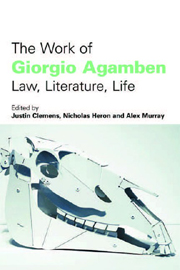Book contents
- Frontmatter
- Contents
- Acknowledgements
- Notes on Contributors
- The Enigma of Giorgio Agamben
- 1 K
- 2 Integral Actuality: On Giorgio Agamben's Idea of Prose
- 3 The Role of the Shifter and the Problem of Reference in Giorgio Agamben
- 4 ‘Its Silent Working was a Delusion’
- 5 Politics and Poetics of Divine Violence: On a Figure in Giorgio Agamben and Walter Benjamin
- 6 Idea of Poetry, Idea of Prose
- 7 The Fading Memory of Homo non Sacer
- 8 Soulblind, or On Profanation
- 9 Face to Face with Agamben; or, the Other in Love
- 10 Beyond Spectacle and the Image: the Poetics of Guy Debord and Agamben
- 11 Dismantling Theatricality: Aesthetics of Bare Life
- 12 Notes on Media and Biopolitics: ‘Notes on Gesture’
- Index
7 - The Fading Memory of Homo non Sacer
Published online by Cambridge University Press: 12 September 2012
- Frontmatter
- Contents
- Acknowledgements
- Notes on Contributors
- The Enigma of Giorgio Agamben
- 1 K
- 2 Integral Actuality: On Giorgio Agamben's Idea of Prose
- 3 The Role of the Shifter and the Problem of Reference in Giorgio Agamben
- 4 ‘Its Silent Working was a Delusion’
- 5 Politics and Poetics of Divine Violence: On a Figure in Giorgio Agamben and Walter Benjamin
- 6 Idea of Poetry, Idea of Prose
- 7 The Fading Memory of Homo non Sacer
- 8 Soulblind, or On Profanation
- 9 Face to Face with Agamben; or, the Other in Love
- 10 Beyond Spectacle and the Image: the Poetics of Guy Debord and Agamben
- 11 Dismantling Theatricality: Aesthetics of Bare Life
- 12 Notes on Media and Biopolitics: ‘Notes on Gesture’
- Index
Summary
Has there been a time before homo sacer? A bios forfeited (proscribed, banned, vogelfrei) and stripped of significance, reduced to zero-status and at the same time unsacrificeable: how far back does the history of this life disposed and disposed-of, supplied and confiscated, go? The question is all the more inevitable as Giorgio Agamben does not subscribe to the confident gesture with which Michel Foucault assigned a date of emergence to Western modernity, a ‘birth’ of what he called ‘biopolitics’. A clean-slate type discontinuity, particularly the idea of modernity as innovation – whether the innovation is a point, or whether it extends over more than a century, makes no decisive difference here – leaves one with the possibility of a calendar, of a sequence of ages succeeding each other in one unique trajectory.
This is exactly what Agamben does not offer. Agamben's stakes in Homo sacer are incompatible with the paradoxically soothing aspects of an approach that deconstructs the Western episode in a series of successive and independent epigenetic creations – and it would be tempting to draw the line through to Martin Heidegger on Seinsgeschichte and historiality. Although Agamben is just as wary as Foucault (from whom his work has doubtlessly received its most decisive impulse, after Heidegger) of the implications of what has become identifiable as the ‘legal’ or ‘juridical’ style of approaching politics and especially biopolitics, and is just as wary of the legalism that unconfessedly inspires a field like epistemology, the results both philosophers reach with respect to historical ‘method’ – and, far more importantly, to history itself – diverge significantly.
- Type
- Chapter
- Information
- The Work of Giorgio AgambenLaw Literature Life, pp. 114 - 131Publisher: Edinburgh University PressPrint publication year: 2008



